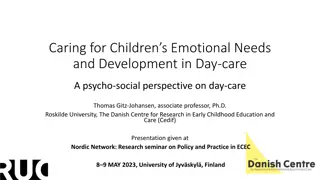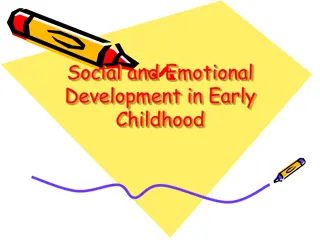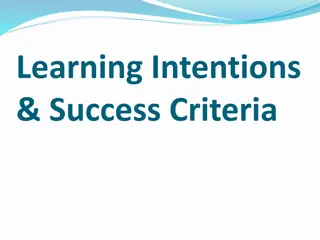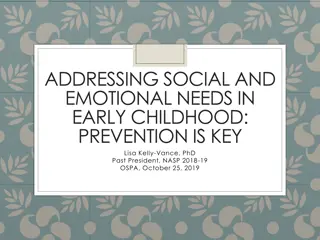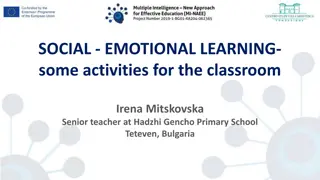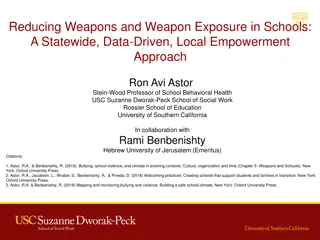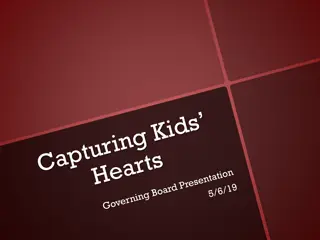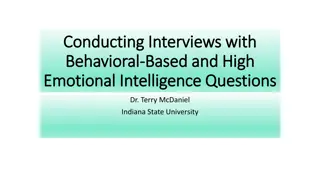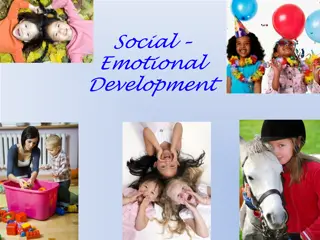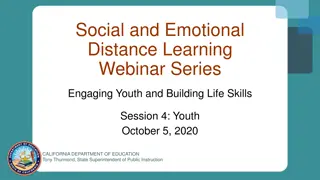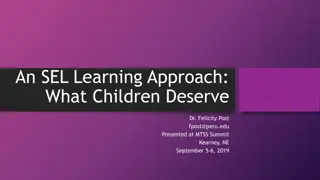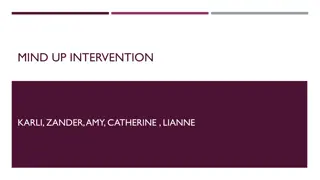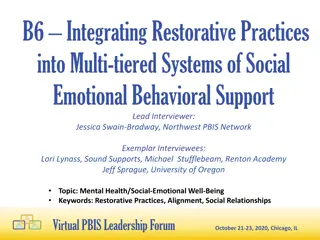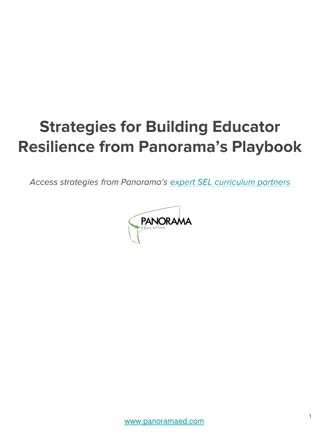Enhancing School Success Through Social and Emotional Learning (SEL)
Understanding the crucial role of Social and Emotional Learning (SEL) in promoting children's ethical development is key to improving academic achievement, fostering positive school climate, and reducing behavioral issues. Research underscores how SEL positively impacts students' overall well-being, academic performance, and lifelong success by enhancing their emotional regulation, interpersonal skills, and ethical decision-making abilities.
Download Presentation

Please find below an Image/Link to download the presentation.
The content on the website is provided AS IS for your information and personal use only. It may not be sold, licensed, or shared on other websites without obtaining consent from the author. Download presentation by click this link. If you encounter any issues during the download, it is possible that the publisher has removed the file from their server.
E N D
Presentation Transcript
School Culture-Increasing Academic Achievement Dewey L. Chapman Superintendent Portage County Educational Service Center Dr. Gloria Dunnivan, Ph.D. Director, Dual Enrollment Kent State University
Positive School Climate Overall psychological and physical atmosphere People like to be there Caring and respect are evident People are responsible for others Students are decision makers
Why Address School Climate? Most pervasive influence in the school Learning distracted by: Unmet health needs Substance use Feeling isolated Worry about bullying Mismatch of teaching/learning
Feeling Connected Teacher caring motivates Feeling connected is protective against: Alcohol and drug use Violence Tobacco use Depression/suicide
Research has shown that Social Emotional Learning (SEL) has an impact on every aspect of children s development: their health; ethical development, citizenship, academic learning and motivation to achieve. Promoting Children s Ethical Development through Social and Emotional Learning CASEL-University of Illinois
Social and Emotional Learning (SEL) Emotions affect how and what we learn Relationships provide foundation for learning Promotes attachment to school Positive effects on academic performance Benefits to physical health Essential for lifelong success Demanded by employers Risk of maladjustment, failed relationships, unhappiness reduced Promoting Children s Ethical Development through Social and Emotional Learning CASEL-University of Illinois
SEL Outcomes Related to School Success Performance Increases in achievement over time Better problem solving and planning Improved learning-to-learn skills Attitudes Better sense of community (bonding) Higher academic motivation and aspirations Increased understanding of consequences of behavior Behavior Increase in prosocial behavior Reductions in aggression and disruptions Lower rate of conduct problems Promoting Children s Ethical Development through Social and Emotional Learning CASEL-University of Illinois
Successful Teaching & Learning Environments are Effective, Efficient, Relevant, & Durable Pupil achievements & behavior can be influenced (for the better or worse) by overall characteristics of school .this means focus on features promoting good functioning at classroom, departmental or whole school level. Improving overall level may be expected to have benefits at the extremes so long as favorable school features do actually impinge on children with special needs. Rutter & Maughan, 2002, pp. 470-471
Motivation Motivation is a concept used to understand what drives people to perform certain activities and persist in them. Students who believe they will be successful engage in more metacognition, use more effective cognitive strategies, persist in tasks longer, and are more likely to perform better in the classroom than students who do not believe they can perform the task. Motivation is positively related to performance and increased learning.
Motivation Teachers have a profound effect on students motivation and aspirations. Teachers who have the most positive influence on students are the ones who are able to generate enthusiasm for learning, and set high standards and high expectations. Teachers who help develop students positive self-concepts and identities increase academic achievement.
Creating a Positive School Climate School Culture School culture is the values, beliefs, behaviors, practices, norms, philosophy, rituals, and ceremonies that characterize a school. Vision turns an organizations core ideology, or sense of purpose, into an image of what the future might become. Boleman and Deal, Reframing Organizations
Creating a Positive School Climate Through Vision The educational leader is responsible for articulating and implementing the vision of the school as well as effectively communicating it to staff, parents, students, and community members.
School Culture Framing an Organization Four frames: structural human resource political symbolic should be utilized when examining the culture of an organization. Reframing Organizations, Boleman and Deal
Structural Frame Focus on rules, roles, goals, and policies that shape an channel decisions and activities. Human Resource Frame Concern with the well-being of staff and students Philosophy for managing people and systems and practices to implement that philosophy.
Political Frame Provides a view of organizations as coalitions with a focus on relationships an alliances that will help foster the vision. Symbolic Frame Focus on how humans make sense of the world through meaning, belief, and faith. Perceived in schools through rituals, ceremonies, heroes and heroines, symbols, and stories.
Dewey L. Chapman Superintendent Portage County Educational Service Center dchapman@portage-esc.org 330-297-1436 Dr. Gloria Dunnivan, Ph.D. Director, Dual Enrollment Kent State University gdunniva@kent.edu 330-672-3743


